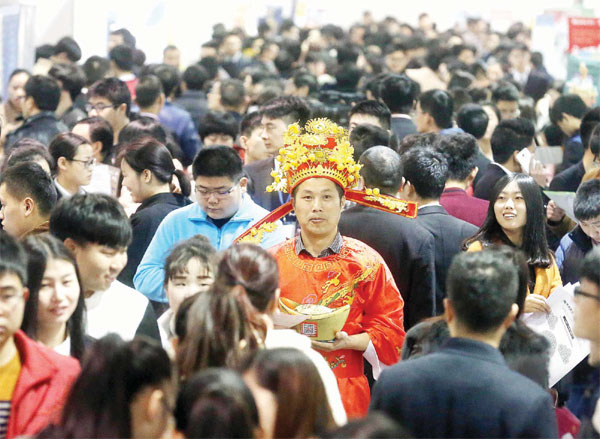Government to gradually raise retirement age
China will gradually raise its statutory retirement age to combat the effects of an aging population, it was announced on Feb 29.
The current policy, which has men retiring at 60, female white-collar workers at 55 and female blue-collar workers at 50, is "out of date", says Yin Weimin, minister of human resources and social security.
"The policy was formulated about 60 years ago when the average life expectancy was relatively low. After so many years, life expectancy has increased," he says. "That's not to mention the aging population trend. Last year, the number of citizens aged over 60 surpassed 220 million, accounting for 16 percent of the population.
|
Representing a prospective employer, a worker dressed as the God of Wealth from Chinese legend attracts the attention of job-seekers at an employment fair in Hangzhou, Zhejiang province, on Feb 27. The employment outlook is grim as 7.65 million university graduates seek jobs this year. Lin Yunlong / For China Daily |
"Currently, the average retirement age in China is under 55, compared with mid-60s in many other countries. Taking these factors into consideration, China should raise the retirement age step by step until it reaches a reasonable level."
Gradually increasing the retirement age would mean, for example, that a worker five years away from retirement when the new policy takes effect would have to work an extra three months, while a worker six years out would work six more months, Yin says.
However, any new policy would not be applied universally to all sectors of the workforce, he says, adding that a reform plan will be released to solicit public opinion within 12 months.
Jin Weigang, a researcher at the Ministry of Human Resources and Social Security, told China News Service that the plan is likely to be implemented in 2022 after a five-year transitional period.
The government's plan to raise the retirement age is in response to China's shrinking workforce and aging population, which has begun to bite into the labor market and pension system.
Population figures show the number of people aged 16 to 60 fell 4.87 million to 911 million last year, the fourth consecutive year of decline.
On Dec 2, the Institute of Population and Labor Economics and the Chinese Academy of Social Sciences published a green paper on population and labor in which researchers suggested a two-step strategy to changing the retirement age.
They recommend China complete the integration of its two pension systems by 2017, and that from 2018, the retirement age for women should be raised one year every three years, and that the retirement age for men should be raised one year every six years.
This would mean that by 2045, the retirement age for both men and women would be 65.
zhaolei@chinadaily.com.cn
Layoffs expected; graduates increase
An estimated 1.8 million workers in China's iron and coal industry will be laid off in the process of reducing excess industrial capacity, according to official data.
"In addition, in the face of a slowing economy, many companies with operational difficulties will not generate as many jobs as before," Yin Weimin, minister of human resources and social security, said on Feb 29.
However, he said he remains positive about overall stability in the labor market, saying measures will be taken by the government to help the unemployed.
"We'll guide enterprises to address downsizing and staff placement through various channels and means. We'll create new job opportunities and provide timely employment services and vocational training to (assist) unemployed people," he says.
"We'll strengthen coordination among departments, improve the policy environment, strengthen entrepreneurial training, establish service platforms and improve services so that employment will be promoted by entrepreneurship."
The expected layoffs add pressure to an employment market where the number of young job-seekers has been increasing annually. Counting graduates from college, high school and secondary vocational schools, Yin says 15 million young job-seekers will be in the market.
The employment outlook this year will be grim, with a record 7.65 million college students graduating and entering the job market amid a slowing economy.
China Daily

























